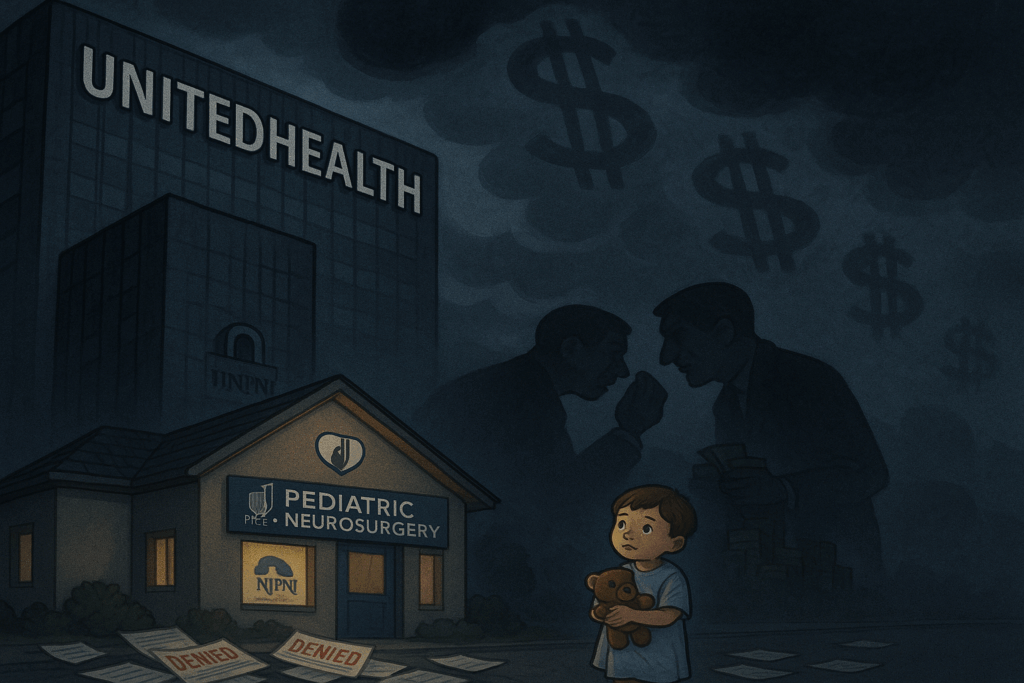Parents, Your Children's Health is Not a Negotiable Line Item. It's Time to Fight Back.
1. The Human Face of a Balance‑Sheet Blood‑Letting
On 19 June 2025, NBC cameras rolled as Dr. Catherine Mazzola, one of New Jersey’s top pediatric neurosurgeons, disclosed that UnitedHealth’s Optum unit began garnishing $68,000 in Medicaid reimbursements—money her practice earned saving children’s lives—just weeks after a ransomware hack on subsidiary Change Healthcare starved providers of cash.(reuters.com)
Two months earlier the Wall Street Journal revealed Optum was issuing repayment demands on its “interest‑free relief loans” with only days’ notice, threatening to withhold future claims if doctors didn’t wire six‑figure sums immediately.(wsj.com) The message was clear: UnitedHealth would plug a cyber‑hole in its own balance sheet even if it bankrupted frontline caregivers.
2. A Data Breach—and a Pattern
The 2024 Change Healthcare breach—the largest in U.S. history, exposing up to 190 million patient records—was caused by a single server that lacked multi‑factor authentication.(en.wikipedia.org) When the dust settled, UnitedHealth had quietly recouped $3.2 billion from providers still drowning in red ink.
3. Eroding Access: Challenges for Pediatric Specialists
United Healthcare's aggressive financial strategies, including "below-market reimbursement rates, excessive claim denials, and delayed payments," directly threaten the operational viability of healthcare providers. This has led to significant contract breakdowns with numerous providers, including major health systems like OHSU, potentially impacting tens of thousands of patients who may lose in-network access. For children, this translates to fewer options for specialized care.
Highly specialized fields like pediatric neurosurgery are particularly vulnerable. Neurosurgery organizations have voiced "deep concerns" about UnitedHealthcare's policy allowing for the retroactive denial of coverage for emergency care, unequivocally stating that it would have "serious medical consequences for patients". Given the critical and often urgent nature of pediatric neurosurgical conditions, such policies can be life-threatening.
UnitedHealth’s misconduct isn’t limited to brute‑force collections. A landmark 2019 Science paper found the Optum risk‑scoring algorithm—used to manage 70 million patients—undervalued Black patients’ health needs by 50 percent, denying them access to high‑intensity care programs.(science.org, theguardian.com) Despite congressional outrage,(wired.com) Optum sold the software for years before a partial patch.

4. The Prior Authorization Maze: Delays, Denials, and Abandonment
Prior authorization (PA) is a process through which health plans require advance approval for medical services or prescriptions. United Healthcare defends PA as an "important checkpoint" that prevents "wasteful overtreatment" and claims it is "rarely used" (99% of the time, members either don't need PA or it's quickly obtained) with "less than 2%" of requests denied.
Investigations have uncovered that UnitedHealthcare routinely holds payments to providers specializing in pediatric brain surgery—services critical for treating life-threatening conditions such as hydrocephalus, brain tumors, epilepsy, and craniosynostosis. This practice has created immense financial and operational burdens for dedicated pediatric neurosurgery centers like the New Jersey Pediatric Neuroscience Institute (NJPNI), ultimately affecting children's timely access to essential healthcare.
This disturbing practice is not isolated. Pediatric healthcare providers nationwide report a troubling pattern of denials and administrative roadblocks from UnitedHealthcare. Parents entrusting their children's lives to specialists often face bureaucratic nightmares, uncertainty, and delays, potentially endangering outcomes and complicating already stressful medical journeys.
The impact is devastating: children facing critical conditions are forced to endure delays in life-saving surgeries, while parents grapple with uncertainty and fear. These payment denials and intentional delays erode trust between insurers, healthcare providers, and families, further exacerbating the emotional trauma experienced by parents already coping with profound stress and anxiety.
If UnitedHealthcare can target children’s healthcare, arguably the most vulnerable population with such disregard, it raises alarming questions about the insurer's broader practices and priorities. Healthcare professionals, parents, and policy advocates must unite and demand immediate action, transparency, and accountability.
5. Follow the Money
UnitedHealth booked $400 billion in 2024 revenue, $32 billion in operating income, and sits on almost $300 billion in assets dwarfing every hospital system it reimburses.(en.wikipedia.org) Bigotry, it seems, scales nicely.
What Readers Can Do Today
For Parents: Advocate for your children's rights. Insist on transparency from your insurers about approvals and payments.
For Healthcare Professionals: Share your stories, document every instance of denial or delay, and collaborate to bring these practices to regulatory attention.
For Policy Advocates: Pressure legislative bodies to investigate and implement stronger oversight mechanisms on insurance companies like UnitedHealthcare, ensuring pediatric patients receive timely, uncompromised care.
For Everyone: Share this story with #UHCPrejudice on social media. Support independent medical practices, book appointments, donate to physician‑relief funds, and refuse to stay silent.
It’s time we draw the line. If insurers feel empowered to compromise children’s critical care, no patient is safe.
Stand up. Speak out. Hold UnitedHealthcare accountable.
UnitedHealth’s size has bred a culture where racially biased code, faith‑based exclusions, and predatory loan claw‑backs are not glitches—they’re features that protect profits. The insurer’s executives won’t change until the cost of discrimination outweighs the revenue it drives. That cost starts rising the moment readers, investors, and lawmakers act.
A future must be envisioned and fought for where a child's health is paramount, not a negotiable line item in a corporate ledger. A system where medical necessity is determined by clinicians, not algorithms calibrated for denial, and where access to care is a right, not a battle of attrition. The time for passive acceptance is over. Parents, unite with advocacy groups, arm yourselves with knowledge, and relentlessly demand accountability from United Healthcare and the entire insurance industry. Your children's future, and the integrity of our healthcare system, depend on it.

